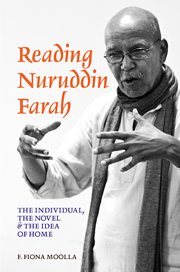Book contents
- Frontmatter
- Contents
- Introduction
- 1 Defining the Individual: Conceptual & Historical Limits
- 2 From a Crooked Rib & the Bildungsroman: Developing the Self, Developing the Nation
- 3 The ‘Gynocentric’ Bildungsroman: Sardines & Gifts
- 4 Modernism in A Naked Needle & Sweet & Sour Milk: Irony, Morality & the Aesthetic
- 5 Close Sesame & the Representation of Heteronomy
- 6 Dissolving the Boundaries of Self & Nation in Maps & Secrets
- 7 Reconstructing the Subject in the Third Trilogy: Links, Knots & Crosbones
- Conclusion
- Bibliography
- Index
1 - Defining the Individual: Conceptual & Historical Limits
Published online by Cambridge University Press: 05 April 2014
- Frontmatter
- Contents
- Introduction
- 1 Defining the Individual: Conceptual & Historical Limits
- 2 From a Crooked Rib & the Bildungsroman: Developing the Self, Developing the Nation
- 3 The ‘Gynocentric’ Bildungsroman: Sardines & Gifts
- 4 Modernism in A Naked Needle & Sweet & Sour Milk: Irony, Morality & the Aesthetic
- 5 Close Sesame & the Representation of Heteronomy
- 6 Dissolving the Boundaries of Self & Nation in Maps & Secrets
- 7 Reconstructing the Subject in the Third Trilogy: Links, Knots & Crosbones
- Conclusion
- Bibliography
- Index
Summary
This book takes as its point of theoretical departure the argument presented by Charles Taylor in Sources of the Self about individualism, modernity and morality. Individualism is a term frequently invoked, but rarely defined or used with consistency. In what represents the most cogent elucidation of the topic, Taylor suggests that individualism is the historically limited form of identity constituted by modernity in the societies of the North-Atlantic. Individualism is the form taken by modern identity, which simultaneously constitutes the concept of identity itself. Philosophically, he shows that any enquiry into the subject, requires that the self be situated within a moral horizon. For Taylor, “selfhood and the good, … selfhood and morality, [are] inextricably intertwined themes” (Sources 3). According to Taylor, the final rupture with earlier forms of subjectivity occurs around the seventeenth or eighteenth centuries when an historically unprecedented break occurs. While the moral horizon had always existed externally in a social and transcendental ideal, in the period of modernity the ethical horizon against which the self is oriented is perceived to be internal to the subject it self-reflexively defines. For the first time, the higher order is not external to the person; instead, the moral sources of the self are seen to be located within the autonomous individual.
Internalisation of moral sources is the key idea applied to the analysis of Farah's novels, which are especially interesting since they adopt a form which does not emerge from Somali social and cultural conditions. Farah's novels are also an interesting case study of the relationship of individualism with the novel since they encapsulate a history of the novel in the career of a single author.
- Type
- Chapter
- Information
- Reading Nuruddin FarahThe Individual, the Novel and the Idea of Home, pp. 16 - 47Publisher: Boydell & BrewerPrint publication year: 2014



